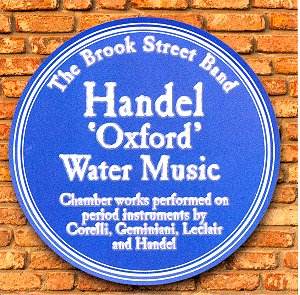Comparison Recordings:
Handel: Trio Sonatas Haydn Society LP
(OP)
Handel: Water Music, HWV 348, Christopher
Hogwood AAM Decca 400 009-2
Corelli: Trio Sonatas, Purcell Quartet
Chandos 0515
It is a tremendous
pleasure to be a reviewer when a disk
like this comes along, as it does only
a couple of times a year. Just to be
able to listen from the first note to
the last with all critical analyses
beguiled, to be able to relax and enjoy
while the performers and engineers do
everything right. There is a perfect
balance of brilliance and sweetness
in the original-instrument tonality.
I was reminded of an ancient Haydn Society
monophonic LP recording which was my
introduction to the Handel Trio Sonatas.
That recording was unfortunately long
ago spoiled and I have waited in vain
for nearly 50 years for a recording
to come along with the same magical
balance of crispness, bounce, swing,
sweetness and dignity; just the right
amount of ornamentation on the repeats
to add interest without getting cute.
I found it almost impossible to sit
still while listening, I wanted to move
my body as I visualised the performers
leaning into the notes, giving that
perfect lilt to the phrase as found
in great ballet music.
The familiar fourth
movement of the Handel Trio Sonata Op.
2, #3, was later used as the second
movement of his Organ Concerto Op. 4,
#2, HWV 290 (both in Bb). The
concerto keyboard part contains imitations
of string phrasing.
Comparing the performances
of the Corelli Opus 1, #7 is an all
but impossible job. Both the Purcell
quartet and the Brook Street Band are
equally stratospheric in quality. It
is like comparing gold and gold. The
Purcells use lute continuo and play
at a slightly faster tempo; the Brook
Streeters use organ. The Purcells ornament
just a little bit more. It is possible
to say that the Brook Street group has
a very slightly more varied tone and
a tiny bit more drama. In the one-movement
sonata Opus 2, #12, the Purcells use
a basso continuo consisting of harpsichord
and cello, and Brook Street Band use
solo organ without cello. Again, the
Purcells are slightly faster, the Brook
Street Band every so slightly more luscious.
The comparison of the
Water Music recordings is a little
easier. Hogwood plays the whole 38 minute
Suite in F with orchestra. The Brook
Street Band plays four movements only
for a total of 7.11 minutes using three
players—oboe, harpsichord, and cello—and
the effect is as natural as if Handel
himself had written it this way. The
trio sonata transparency is just right
for some of the Water Music pieces
which to my taste have often sounded
too thick as they are usually played;
the doublings and harmonic reinforcements
which were necessary for outdoor performance
hardly need be indulged for chamber
performance, and can be rightly forsaken.
This work has earned the group the Byrne
award from the Institute for Handel
Scholarship. From the G minor Suite
they play two movements (on recorder
instead of oboe, adding a violin), and
from the D major Suite, three (everybody
plays in this one), for a total timing
of 14.31. Obviously this recording,
despite its title, will hardly stand
in for a full length orchestral performance
of this music, but probably most people
already have one they like and can appreciate
this fresh viewpoint on selected movements.
The Leclair is completely
unknown to me, but they play it with
virtuosity and a clear sense of French
style with the just the right amount
of swing.
The cello and first
violin are actual period instruments,
the others are modern copies. The sound
is unusually clear, realistic, and undistorted;
and it will open up nicely in your surround
sound player.
Paul Shoemaker
